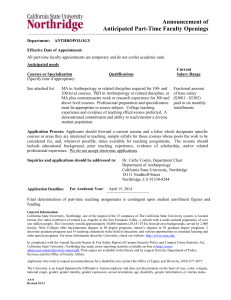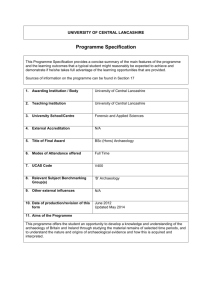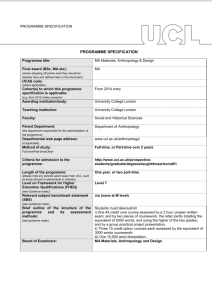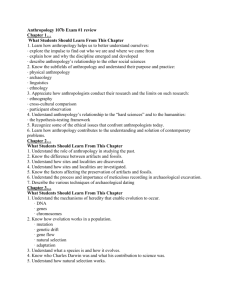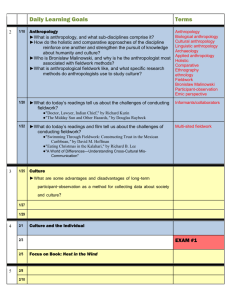BSc (Hons) Archaeology and Anthropology
advertisement
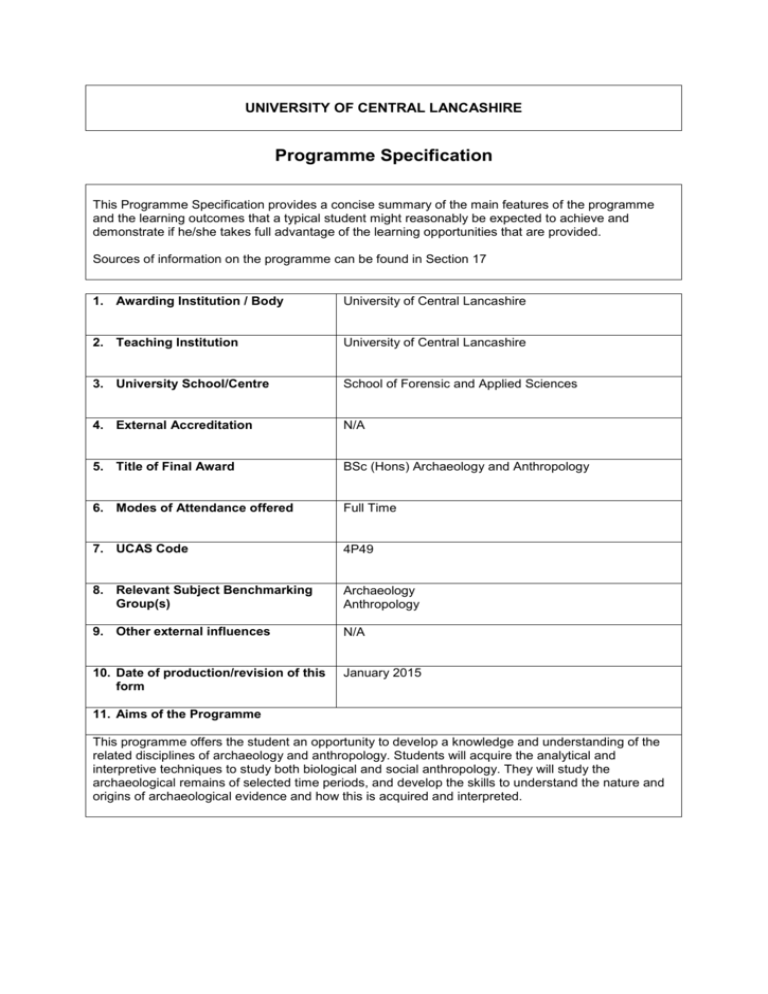
UNIVERSITY OF CENTRAL LANCASHIRE Programme Specification This Programme Specification provides a concise summary of the main features of the programme and the learning outcomes that a typical student might reasonably be expected to achieve and demonstrate if he/she takes full advantage of the learning opportunities that are provided. Sources of information on the programme can be found in Section 17 1. Awarding Institution / Body University of Central Lancashire 2. Teaching Institution University of Central Lancashire 3. University School/Centre School of Forensic and Applied Sciences 4. External Accreditation N/A 5. Title of Final Award BSc (Hons) Archaeology and Anthropology 6. Modes of Attendance offered Full Time 7. UCAS Code 4P49 8. Relevant Subject Benchmarking Group(s) Archaeology Anthropology 9. Other external influences N/A 10. Date of production/revision of this form January 2015 11. Aims of the Programme This programme offers the student an opportunity to develop a knowledge and understanding of the related disciplines of archaeology and anthropology. Students will acquire the analytical and interpretive techniques to study both biological and social anthropology. They will study the archaeological remains of selected time periods, and develop the skills to understand the nature and origins of archaeological evidence and how this is acquired and interpreted. 12. Learning Outcomes, Teaching, Learning and Assessment Methods A. Knowledge and Understanding A1. Explain and describe the archaeology of Britain & Ireland, and of other parts of the world where appropriate A2. Describe and identify human osteological material in both archaeological and anthropological analysis A3. Describe and identify the archaeology of selected chronological periods A4. Explain and interpret different human cultures A5. Explain and use the means which archaeological and anthropological data are acquired and analysed A6. Explain the importance of the recovery of primary data through practical experience Teaching and Learning Methods (A1-A5) Acquisition of core knowledge mainly through lectures supplemented by seminars, directed reading and independent study, but augmented by a wide variety of field experiences and where appropriate, laboratory work. (A5-A6) A period of excavation will allow students to train in practical skills and concepts of archaeological fieldwork. Assessment methods (A1-A6) Assessment will be through coursework (essays, field reports, oral presentations, the dissertation) and examinations. B. Subject-specific skills B1. Apply the core fieldwork techniques of identification, surveying, excavating, recording, measurement, analysis and interpretation B2. Observe and describe different classes of primary archaeological and anthropological data, and objectively record their characteristics B3. B4. Independently carry out practical techniques important in cultural and biological anthropology Critically interpret anthropological data and write reports B5. Assemble coherent research/project designs and complete a substantial piece of independent supervised research (the Dissertation) Teaching and Learning Methods (B1) will be achieved through excavations and preparatory lectures on technique and safety assessment. Lectures, seminars and laboratory practical work will support (B2). The dissertation, and associated module on research skills, will support (B3-B5). Assessment methods Assessment will be through coursework (essays, a project reporting excavation experience and results, short reports, computer practicals), examinations and the written dissertation. C. Thinking Skills C1. Draw down and apply appropriate scholarly, theoretical and scientific principles and concepts to archaeological and anthropological problems C2. Discover and define the significance of material culture and landscapes C3. Marshal and critically appraise other people’s arguments C4. Produce logical and structured arguments supported by relevant evidence C5. Evaluate different cultures, and deal with unfamiliar situations C6. Evaluate one’s own and others’ opinions critically, Teaching and Learning Methods (C1-C6) Lectures and seminars, field visits, talks by external professionals, field study and laboratory work form the major methods of teaching and learning, plus in-class discussion and individual meetings with dissertation tutors (C2-C6). Assessment methods Assessment will be through coursework (essays, computer-based reports, individual and group projects, field reports, in-class tests, student initiated reports, oral presentations), the dissertation and examinations. D. Other skills relevant to employability and personal development D1. Communicate to different kinds of audience D2. Effectively apply numeracy and IT skills D3. Identify and evaluate different roles within groups and teams, and adopt and accommodate a range of personal styles D4. Self-manage and reflect as part of on-going professional development e.g. self-review, action planning, production of a CV D5. Retrieve information using paper-based and electronic resources D6. Collate and evaluate information from a range of sources. Teaching and Learning Methods Personal Development will take place at all levels of the programme and through the wide range of activities on the degree. Most of these skills are introduced in year one Study Skills, and are further developed through end of year reflective review and discussion with personal tutors, through group work and seminars. All learners will use information technology throughout the course and will be involved in communicating findings of individual and group work (D.1, D.2, D.3,D.4). The development of a critical approach to interpretation and learning is progressive and culminates in the production of a dissertation (D.1, D.2, D.5, D.6). Assessment methods Assessment is primarily through coursework exercises, some of which include an element of reflection, group assignments, posters, oral presentations on project work and on dissertations, and in the assessment of the dissertation. Formative assessment makes an important contribution to the development of these skills. 13. Programme Structures* Level Level 6 Module Code FZ3202 FZ3212 Archaeology and Anthropology Dissertation Debates in Anthropology FZ3209 plus 60 optional credits from: Forensic Taphonomy Hunter Gatherers: Past and Present Life and Death in Medieval Britain Archaeology and anthropology of the Modern World Late Bronze Age and Iron Age Britain Neolithic and Early Bronze Age Britain and Ireland Roman and Post Roman Britain FZ2201 FZ2202 FZ2051 Archaeological Fieldwork I Research and Study Forensic Anthropology FZ3051 FZ3203 FZ3204 FZ3205 FZ3207 FZ3208 Level 5 Module Title 14. Awards and Credits* Credit rating 40 20 40 20 20 20 20 Bachelor Honours Degree Requires 360 credits at Level 4 or above including a minimum of 220 at Level 5 and 100 at Level 6 Bachelor Degree Requires 320 credits at Level 4 or above including a minimum of 180 at Level 5 or above and 60 at Level 6 20 20 20 20 20 HE Diploma Requires 240 credits at Level 4 or above including a FZ2211 NT2013 FZ2204 FZ2203 FZ2205 FZ2207 FZ2208 FZ2209 Level 4 FZ1201 FZ1202 FZ1206 FZ1204 FZ1205 FZ1054 Cultural Anthropology in Theory and Practice plus 40 optional credits from: Environmental Change Neolithic and Early Bronze Age Britain and Ireland Late Bronze Age and Iron Age Britain Roman and Post Roman Britain Hunter Gatherers: Past and Present Life and Death in Medieval Britain Archaeology and Anthropology of the Modern World The Archaeology of Britain Introduction to Archaeology Introduction to Cultural Anthropology Study Skills for Archaeology and Anthropology Bones, Bodies and Burial Introduction to Osteology and Anthropology 20 minimum of 100 at Level 5 or above 20 20 20 20 20 20 20 20 20 20 HE Certificate Requires 120 credits at Level 4 or above 20 20 20 15. Personal Development Planning This is a structured and supported process undertaken by an individual to reflect upon their own learning, performance and / or achievement and to plan for their personal, educational and career development. PDP is delivered and monitored through skills modules and the personal tutor system. Students are provided with a PDP handbook in electronic format and are introduced to the idea by their personal tutor (PT). Their PT will then guide them throughout their time at university, both in constructing their PDP and in making sure that they are developing the right skills, helping them to identify and address any issues. Each student sees their PT six times a year (seven in first year) for a small group tutorial where the PT and other students will discuss a particular skill or employability issue. Typically the student will have prepared a document or done a task in preparation for the meeting. Topics targeted at meetings include time management and vocabulary developing at Level 4, ranging up to psychometric testing and help with job applications at Level 6. These tutorials help students to identify and develop their skills and also encourage a culture of confidence between tutee and PT, so that if any specific problems arise with a student the PT will be in a position to assist. The PT topics are constantly reviewed and updated in response to current practice in the workplace and to feedback from PTs and tutees. PTs insist on seeing a completed PDP before writing references. There are three main elements to PDP in Archaeology and Anthropology. 1) The Structured Learning Environment: the lecture; seminar; lab session; excavation; field survey or other practical exercise. 2) Feedback: supported through one to one direct contact during fieldwork; assessment and assessment meetings on formally submitted work; meetings with personal tutor – in particular the review of the student’s developing CV undertaken at the end of every semester. 3) Reflection: supported through assessed reflective reports on fieldwork; module evaluation questionnaires; facilitated by personal tutor meetings and end of semester CV reviews. 16. Admissions criteria Programme Specifications include minimum entry requirements, including academic qualifications, together with appropriate experience and skills required for entry to study. These criteria may be expressed as a range rather than a specific grade. Amendments to entry requirements may have been made after these documents were published and you should consult the University’s website for the most up to date information. Students will be informed of their personal minimum entry criteria in their offer letter. Applicants will normally be required to have, one of: BBC at A2, ND with DMM, IB- 24P. Pass Access Course with Merits in 30 Level 3 Credits. In addition applicants will be required to have five GCSE passes at Grade C or equivalent including Maths and English. Applicants will be required to have a minimum level of proficiency in English Language equivalent to IELTS grade 6 with no subscore lower than 5.5 Applications from individuals with non-standard qualifications, relevant work or life experience and who can demonstrate the ability to cope with and benefit from degree-level studies are welcome. If candidates have not studied recently they may be required to undertake an Access programme. APL/APEL will be assessed through standard University procedures. Please consult the UCLAN admissions department for the most up to date requirements. 17. Key sources of information about the programme University web site (www.uclan.ac.uk) UCAS web site (www.ucas.ac.uk) School website (www.uclan.ac.uk/forensic) Course Leader Admissions tutor 18. Curriculum Skills Map Please tick in the relevant boxes where individual Programme Learning Outcomes are being assessed Programme Learning Outcomes Level 4 Level 5 Level 6 Level Core (C), Compulsory (COMP) or Option (O) B1 B2 B3 B4 B5 C1 C2 C3 C4 C5 C6 Other skills relevant to employability and personal development D1 D2 D3 D4 D5 D6 X X X X X X X X X X X X X X X X X X X X X X X X X X X X X X X X X X X X X X X X X X X X X X X X X X X X X X X X X X X X X X X X X X X X X X X X X X X X X X X X X X X X X X X X X X X X X X X X X X X X X X X X X X X X X X X Knowledge and understanding Subject-specific Skills Module Code FZ3202 Module Title Archaeology and Anthropology Dissertation COMP FZ3212 Debates in Anthropology COMP FZ3051 Forensic Taphonomy O FZ3203 Hunter Gatherers: Past and Present O X X FZ3204 Life and Death in Medieval Britain O X X FZ3205 Archaeology and anthropology of the Mo O X X FZ3207 Late Bronze Age and Iron Age Britain O X X FZ3208 Neolithic and Early Bronze Age Britain O X FZ3209 Roman and Post-Roman Britain O X FZ2201 Archaeological Fieldwork I COMP X X X FZ2202 Research and Study COMP X X X FZ2203 Late Bronze Age and Iron Age Britain O X X FZ2204 Neolithic and Early Bronze Age Britain O X X FZ2205 Roman and Post Roman Britain O X X FZ2211 Cultural Anthropology in theory and practice COMP FZ2207 Hunter Gatherers: Past and Present O X X FZ2208 Life and Death in Medieval Britain O X X FZ2209 Archaeology and anthropology of the O X X FZ2051 Forensic Anthropology COMP NT2013 Environmental Change O X X X FZ1201 The Archaeology of Britain COMP X X X X FZ1202 Introduction to Archaeology COMP X X X X X X X X FZ1206 Introduction to Cultural Anthropology COMP X X X X X FZ1204 Study Skills for Archaeology and Anthro COMP FZ1054 Introduction to Osteology and Anthropo COMP X X X FZ1205 Bones, Bodies and Burial COMP X X Note: A1 A2 A3 A4 A5 X X X X X X X X X X X X X X X X X X X X X X X X X X X X X X X X X X X X X X X X X X X X X X X X X X X X X X X X X X X X X X X X X X X X X X X X X X X X X X X X X X X X X X X X X X X X X X X X X X X X X X X X X X X X X X X X X X X X Mapping to other external frameworks, e.g. professional/statutory bodies, will be included within Student Course Handbook X X X X X X X X X X X X X X X X X X X X X X X X X X X X X X X X X X X X X X X X X X X X X X X X X X X X X X X X X X X X X X X X X X X X X X X X X X X X X X X X X X X X X X X X X X X A6 Thinking Skills X X X X X X X X X X X X X X X X X X X X

